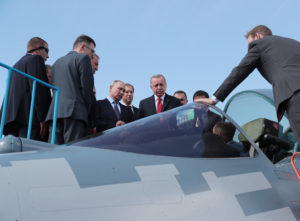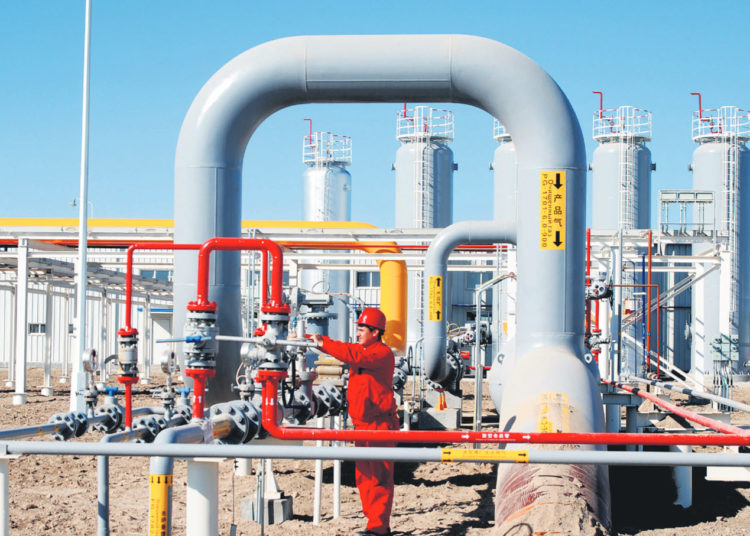Abdullah Bozkurt/Stockholm
Facing serious challenges in upcoming elections amid a troubled economy, Turkish President Recep Tayyip Erdoğan has turned to Russia for help in boosting cash reserves, rehabilitating his battered image and offering consumers relief with deep cuts in the price of energy.
Talking to reporters on his way back from a Balkans tour last week, Erdoğan revealed ongoing negotiations with Russian President Vladimir Putin about a discount on the price of natural gas. “Russia hasn’t imposed any sanctions on us. I had a talk with him about the price [of gas deliveries],” he told reporters. “If he approaches this positively, then this would be the ‘crème de la crème’ because our goal is to provide as much electricity and natural gas as possible to our citizens under more favorable terms.”
Erdoğan’s popularity has been declining in Turkey, and his ruling Justice and Development Party (AKP) has lost significant support according to polls, mainly stemming from soaring inflation and high unemployment, especially among young people, and rising food and energy prices. His first priority is to stop Russia from cutting gas supplies to Turkey as Putin did to Europe, and more importantly to obtain concessions from Moscow for a discounted price while Moscow looks ways to beat Western sanctions.
The Turkish president’s public remarks during a trip to Bosnia, Serbia and Croatia in which he sided with Putin on cutting off gas to Europe, opposed sanctions and accused the West of provoking Russia were partly aimed at pleasing Putin ahead of talks in Uzbekistan about helping him win re-election in Turkey.

Erdoğan has already declared that his government would not join the sanctions on Russia and opened the Turkish financial and banking systems to Russian oligarchs who wanted to escape Western sanctions and avoid asset freezes and seizures.
In his comments on the plane, Erdoğan said some companies had already parked their cash in Turkey because, he claimed, “There’s no trust in any other country. But there is confidence in Turkey at this point. My colleagues and I are conducting many meetings on this issue, and we’ve gotten positive results because of these meetings,” he explained.
He boasted about an improvement in the foreign currency reserves of the Turkish Central Bank in recent weeks and attributed this trend to the cash inflow to Turkey.
Erdoğan’s track record on such tactics speaks for itself. For years his government helped the Iranian regime bypass sanctions imposed by the US, with Turkish state banks laundering money for Iranian entities. He and his cronies enriched themselves in the meantime from bribes and kickbacks they obtained from such operations.
Graft probes in 2013 revealed that Erdoğan and his associates took a huge amount of bribes from an Iranian operative named Reza Zarrab, who laundered Iranian government funds using Turkish state bank Halkbank in order to avoid US sanctions. The same probes showed that Erdogan’s son Bilal secretly took money from one-time al-Qaeda financier Yasin al-Qadi, a close friend of the Turkish president, although al-Qadi was at one time designated as a financier of terrorism by both the US and the UN.
It’s not just financial and economic benefits Erdoğan has been seeking from Putin’s Russia. He also wants political support during the 2023 elections. More significantly, he is after Russia’s lobbying power in Turkey, where Moscow has over the years built a huge network of influence operations. Many Turkish pundits and experts including former generals often appear on Turkish debate programs repeating talking points made by Moscow while throwing their support to the Erdoğan government.
Pro-Kremlin Russian media outlet Sputnik has a Turkish edition, and its coverage has been very pro-Erdoğan in recent years. Although Europe blocked Russian media outlets such as RT and Sputnik on the grounds that they have engaged in “continuous and concerted propaganda actions targeted at the [EU] and neighboring civil society members, gravely distorting and manipulating facts,” the Erdoğan government has allowed them to keep broadcasting in Turkey.
According to former intelligence officer Enver Altaylı, who has studied Russia for decades and believes Russia has imperial goals, with Turkey being one of Moscow’s targets, the negative views of the Turkish public towards the US, the West and NATO during the Russian-Ukrainian war must be attributed to intelligence activities by the Russian secret service FSB, which expended a significant amount of money to build a pro-Russia and anti-West Turkey.
“Many journalists are paid with these funds for their propaganda in favor of Russia no matter what,” he claimed.
“You may have read that according to recent surveys, almost half the Turkish public thinks Russia is not responsible for the bloodshed in Ukraine. This situation proves one thing: This Russian intelligence fund is managed very successfully in Turkey. Whoever administers the Turkish part of this fund should be given a medal by Russia!” he wrote.
Indeed, according to a survey conducted in June by the Ankara-based Metropoll company that Altaylı mentions, some 48 percent of Turks hold the United States and NATO, of which Turkey has been a member since 1952, responsible for the Russian invasion of Ukraine, while only 34 percent think Russia is responsible for it.












